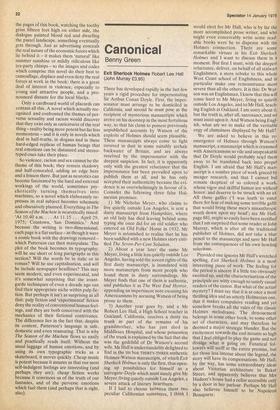Canonical
Benny Green
Exit Sherlock Holmes Robert Lee Hall (John Murray E3.95)
There has developed rapidly in the last few years a rigid procedure for impersonating Sir Arthur Conan Doyle. First, the impersonator must arrange to be domiciled in California, and second he must pose. as the recipient of mysterious manuscripts which arrive on his doorstep in the most fortuitous way, so that his claim to possess previously unpublished accounts by Watson of the exploits of Holmes should seem plausible. These manuscxipts always come to light covered in dust in some suitably archaic backwater of Britain, and are always received by the impersonator with the deepest suspicion. In fact, it is apparently only with the greatest reluctance that the impersonator has been prevailed upon to' publish them at all, and he has only accepted their authenticity because the evidence is so overwhelmingly in favour of it. Consider the following three false Holmesian premises:
1) Mr Nicholas Meyer, who claims to live quietly outside Los Angeles, is sent a dusty manuscript from Hampshire, where an old lady has died leaving behind some typing she once did for an old soldier who entered an Old Folks' Home in 1932. Mr Meyer is astonished to realise that he has been saddled with a new Holmes story entitled The Seven-Per-Cent Solution.
2) About a year later the same Mr Meyer, living a little less quietly outside Los Angeles, having sold the screen rights of the first dusty manuscript, is inundated with more manuscripts from more people who found them in dusty surroundings. Mr Meyer finds that one of them is authentic, and publishes it as The West End Horror, appending an impertinent note excusing his Americanisms by accusing Watson of being prone to them.
3) Another year goes by, and a Mr Robert Lee Hall, a High School teacher in Oakland, California, receives a dusty tin trunk as part of the remains of his grandmother, who has just died in Middlesex Hospital, and whose possession of the trunk is explained by the fact that she was the godchild of Dr Watson's second wife. Mr Hall is understandably delighted to find in the tin box THIRTY-THREE authentic Holmes-Watson manuscripts, of which Exit Sherlock Holmes is only the first, thus opening up possibilities for himself as a 'surrogate-Doyle which must surely give Mr Meyer, living quietly outside Los Angeles, a severe attack of literary heartburn.
If I had to choose between these two would elect for Mr Hall, who is by far the more accomplished prose writer, and who might even conceivably write some readable books were he to dispense with the Holmes connection. There are some remarkable virtues in his Exit Sherlock Holmes and I want to discuss them in a moment. But first I must, with the deepest reluctance, deliver, on behalf of all stalwart Englishmen, a stern rebuke to this whole West Coast school of Englishness, and in particular make one remonstrance more severe than all the others. It is this: Dr Watson was an Englishman. I know that this will come hard to Mr Meyer, living so quietly outside Los Angeles, and to Mr Hall, teaching English at Oakland. I am sorry about it, but the truth is, after all, sacrosanct, and we must insist upon it. And Watson being English, what are we to make of the veritable orgy of clumsiness displayed by Mr Hall?
We are asked to believe in this reemergence of Holmes through Watson's manuscript, a manuscript which is crammed with Americanisms so vile and unspeakable that Dr Doyle would probably send them away to be translated back into proper.
English. I am afraid that Mr Hall's man uscript is a somber piece of work graced by meager research, and that I cannot but remain skeptical of so colored a work, whose vigor and skillful humor are without honor, and deserve to be struck with an ax.
All these gaffes CI was loath to enter there for fear of making some terrible gaffe that would bring these men's misanthropic wrath down upon my head'; see Mr Hall, page 88), might so easily have been rectified that I am surprised that some reader at John Murray, which is after all the traditional publisher of Holmes, did not take a blue pencil to the manuscript and save Mr Hall from the consequences of his own howling solecisms.
Provided one ignores Mr Hall's wretched spelling, Exit Sherlock Holmes is a most interesting piece of work. The feeling for the period is sincere if a little too obviously swotted up, and the characterisations of the principals are witty enough to satisfy casual readers of the canon. But what of the actual mystery? I must say that it is at once a most thrilling idea and an utterly Holmesian one, that it makes compulsive reading and yet somehow breaks all the rules of the classic Holmes melodrama. The denouement belongs in some other book, to some other set of characters, and may therefore be deemed a major strategic blunder. But the excitement towards the end mounts so high that I feel obliged to play the game and not divulge what is going on. Fanatical followers will scoff at the entire premise, but for those less intense about the legend, the story will have its compensations. Mr Hall, by the way, has some extraordinary ideas about Victorian architecture in Baker Street, and apparently believes that Mrs Hudson's house had a cellar accessible only by a door in her parlour. Perhaps Mr Hall also believes himself to be Napoleon Bonaparte.






























 Previous page
Previous page